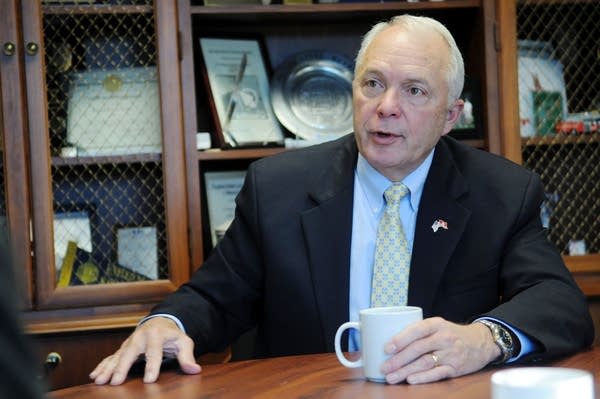Kline's education reform vision: less federal cash, more school autonomy

While Congress may seem locked in endless budget battles, lawmakers from both parties are trying to overhaul education laws, including No Child Left Behind. Minnesota Rep. John Kline is in charge of that effort for House Republicans.
Kline became the chairman of the House Education and Workforce Committee this January. He's spent much of the past few months getting his committee up to speed and talking to school administrators.
"What they've asked for in roundtable discussion after roundtable discussion, meeting after meeting, was look, this needs to be simpler, needs to be more flexible," Kline said. "The federal role is too complicated, too big."
Republicans and Democrats have been unhappy with No Child Left Behind. The main criticism is that the law sets up schools and students to be labeled as failures. As many as 80 percent of the nation's schools could soon be considered failing under the law.
Create a More Connected Minnesota
MPR News is your trusted resource for the news you need. With your support, MPR News brings accessible, courageous journalism and authentic conversation to everyone - free of paywalls and barriers. Your gift makes a difference.
Both parties also agree in principal that No Child Left Behind emphasized how many degrees a teacher has over whether actual classroom effectiveness. But when it comes to specifics about exactly what the federal government's role in education should be, Kline is less clear.
"I am convinced that the federal government has intruded too far," Kline said. "We are trying to get the federal government out of the way and if it is necessary for support, we are evaluating that as we go forward."
As a first step, Kline's committee recently passed a bill that would eliminate half of the 80-some specialized programs created by No Child Left Behind.
Kline said many of those programs are redundant and don't even have the support of the Obama administration.
But Kline will also have to get Senate Democrats to sign off on those cuts, and already there's some opposition.
Democratic Sen. Al Franken sits on the Senate Education Committee.
"I'm concerned because there's very different philosophies, and what we saw come out of the House was not encouraging ... their first thing was to kill a whole bunch of programs," Franken said.
In addition to eliminating programs, Kline said his committee wants to loosen restrictions on how school districts can use the money they get from the federal government.
"I can't tell you how many superintendents have told me, there's money here that I can't use and I need it over there. And I can't spend it over there because of federal restrictions."
That's a big shift away from the Bush administration, said Cynthia Brown, who works on education policy at the liberal think-tank Center for American Progress.
"Historically, the federal role in education has been to disadvantaged students and those who have the greatest needs," she said.
But if Kline's approach becomes policy, the traditional federal goal of eliminating inequalities will go away, Brown said.
"Basically what this proposal is saying is that there isn't a federal role in education, except to provide money," Brown said.
But even if the federal government just becomes a conduit for money, Kline said states and school districts should prepare for austerity.
"The pot of federal money for almost everything is shrinking," Kline said.
For many school districts faced with tight state and local budgets, it's money that matters.
Gary Amoroso is in his final days as superintendent of the Lakeville Area Public Schools in Kline's district. He'll soon become a lobbyist for all of the state's superintendents.
"Our greatest challenge are the amount of resources," he said.
The vast majority of the money for Amoroso's school system comes from state, not federal, coffers. But Amoroso said if federal support shrinks, his successor in Lakeville will have to get creative about shifting money around.
"But when those dollars are reduced, it still causes us to need to make decisions on how to fund those programs if we feel that they are essential for our students," he said.
The takeaway for schools in Minnnesota and the rest of the country is that if Kline's vision prevails, they'll get less from the federal government, but more flexibility on how to spend it.
